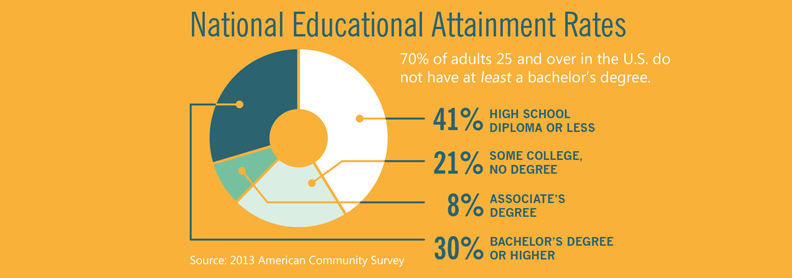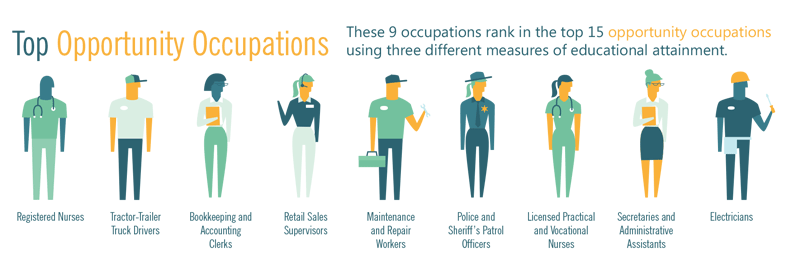It's apparently gotten tougher to make a good living without a bachelor's degree. But Economy Matters finds that just how tough depends a lot on where you live.

Employment in occupations that don't require a four-year college degree but offer decent pay declined sharply the past several years. Yet the proportion of those jobs as a share of overall employment differ markedly among the nation's 100 largest metropolitan areas, according to a new report by researchers from the Federal Reserve Banks of Atlanta, Cleveland, and Philadelphia.
Nationwide, the number of jobs in "opportunity occupations," as the researchers term them, slid by 1.7 million between 2005 and 2014, even as total employment increased by nearly 5 million. Consequently, the share of all U.S. jobs in opportunity occupations fell from 29.8 percent to 27.4 percent, says the report Identifying Opportunity Occupations in the Nation's Largest Metropolitan Economies. The authors define opportunity occupations as jobs that are generally open to people without a bachelor's degree and that pay at least the national annual median wage, adjusted for differences in local cost of living.

Stuart Andreason
"These occupations are important, as it's easy to forget that 70 percent of Americans age 25 and older don't have a four-year degree," says Stuart Andreason, senior adviser in the Atlanta Fed's Community and Economic Development group. Andreason wrote the paper along with Keith Wardrip of the Philadelphia Fed and Kyle Fee and Lisa Nelson of the Cleveland Fed.
The most numerous jobs in opportunity occupations include registered nurses, supervisors of office and administrative support workers, bookkeeping and accounting clerks, truck drivers, and executive administrative assistants.
Southeast's economic diversity reflected in results
Among the report's major findings: the quantity of these jobs depends on where you look. The share of opportunity occupations "varies dramatically across the metropolitan areas in our study, ranging from 36.6 percent to well under half that level," the report says. The numbers also vary depending on the type of data examined. For example, totals based on data from the U.S. Bureau of Labor Statistics differ from those based on online job postings.
Metro areas in the Southeast that are among the 10 with the greatest share of opportunity occupations include Birmingham and Baton Rouge. Their higher share likely stems from those cities' long histories of heavy industry, Andreason reasons.
On the flip side, metros that are among the 10 with the lowest share of opportunity occupations include four Florida locales: Sarasota, Tampa-St. Petersburg, Miami, and Orlando. Andreason figures those cities have comparatively low shares because relatively lower-paying jobs in leisure and hospitality pervade the Sunshine State's vibrant tourism industry.
Employers relaxing standards as labor market recovers?
In a bit of good news for workers, Identifying Opportunity Occupations found that employers may be relaxing their educational requirements. Why that appears to be happening is a popular question, Andreason says.
But for now it's a question without a clear answer. One possibility is that employers have become less selective as a stronger labor market shrinks the pool of job seekers. Or it could be that better workforce development programs, including training tailored to particular jobs, are making a college degree less relevant, Andreason says.
Research on opportunity occupations can help shape workforce development policy. Indeed, one topical concern is how development and training programs should adapt as the economy recovers. They might, for instance, shift focus from preparing unemployed people for jobs and toward helping employed people refine their skills to secure better positions, Andreason notes.
Many questions surrounding opportunity occupations and related implications for workforce development remain unanswered. Therefore, Identifying Opportunity Occupations emphasizes the need for more research on the subject.






